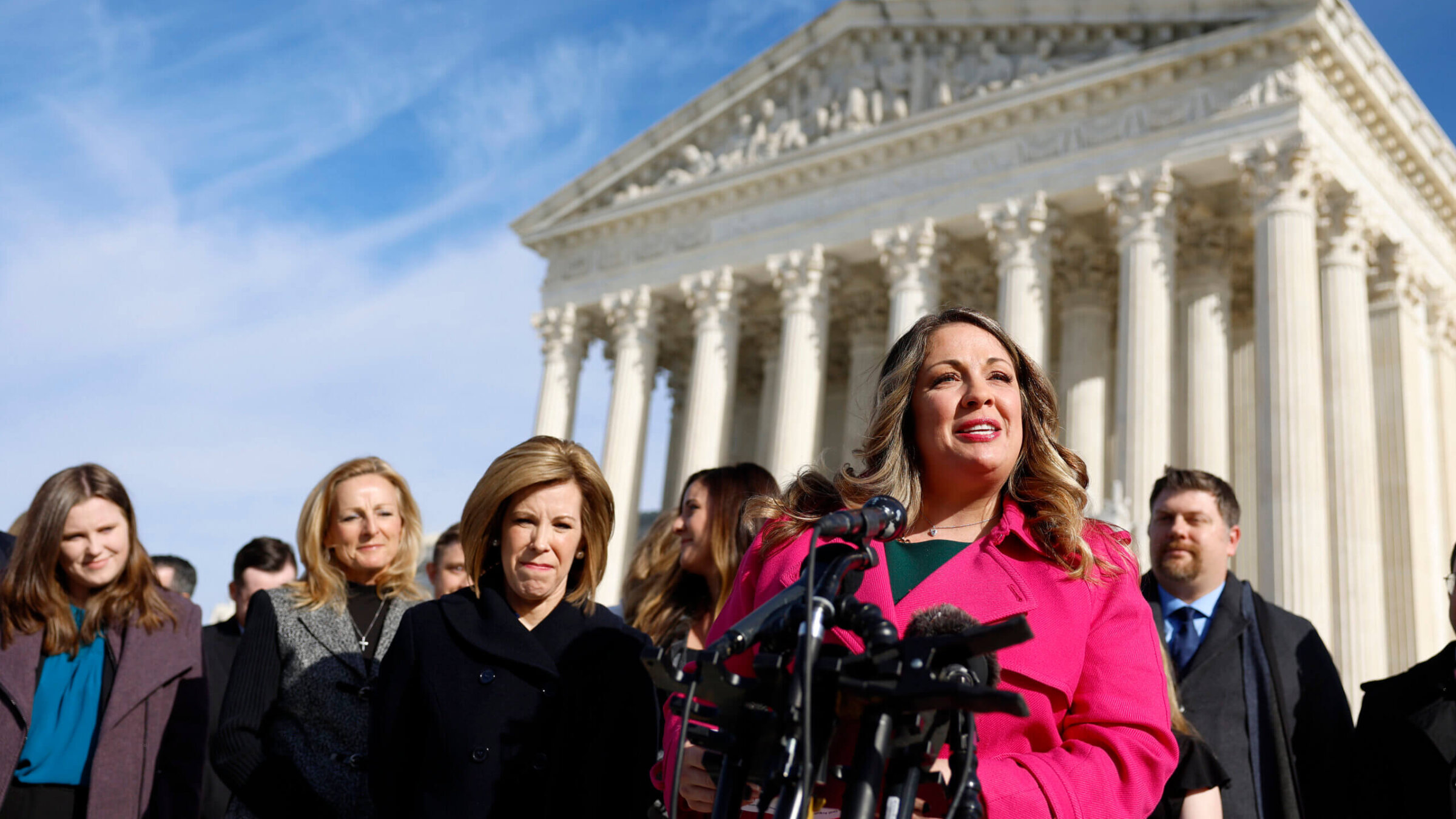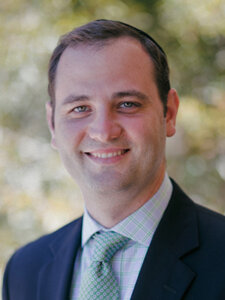Religion won at the Supreme Court, but not as big as people think
The court issued relatively modest decisions on behalf of the worker seeking Sundays off and the anti-LGBTQ+ web designer

Lorie Smith, the owner of 303 Creative, a website design company in Colorado, speaks to reporters outside of the U.S. Supreme Court Building on December 05, 2022 in Washington, DC. Photo by Anna Moneymaker/Getty Images
If Supreme Court decisions were consumed as a sporting event, then religion won 2-0 and continued its hot streak before the highest court. This past Supreme Court term featured two blockbuster church-state cases where the justices found in favor of religious plaintiffs seeking to have their religious commitments shielded by the law.
Indeed, many headlines characterized the court’s decisions precisely as a slam dunk for religion, to the chagrin of those who see the justices putting too many wins in the church column and too many losses in the state column.
The problem, however, is that law doesn’t translate well into sports metaphors. Instead, these two cases — one addressing religious accommodations in the workplace, the other free speech exceptions to anti-discrimination law — provided basic guidelines for navigating challenging conflicts in the future. In so doing, the court issued relatively modest decisions where, upon careful review, there was ultimately less there than originally meets the eye.
The first church-state case decided by the court, Groff v. DeJoy, addressed religious accommodations in the workplace: How far must an employer go when it comes to accommodating such requests? (Full disclosure: I co-authored an amicus brief on behalf of the Orthodox Union in this case.) At issue was a lawsuit filed by Gerald Groff, a U.S. Postal Service worker whose request to take off on his Sunday Sabbath was denied, leading to his ultimate termination.
Title VII of the 1964 Civil Rights Act requires employers to reasonably accommodate religion unless doing so presents an “undue hardship.” The words themselves seem to require an employer to potentially expend effort and resources to accommodate an employee’s religious practices — such as finding an alternate employee to cover Sabbath shifts.
Lower courts had denied Groff’s claim, however, largely based upon a 1977 Supreme Court case—TWA v. Hardison—that had diluted the standard for evaluating an employer’s obligation to accommodate. Based on Hardison, if accommodating a religious employee even presented a “de minimis” burden — that is, a minor or trifling burden — that employer was off the hook.
Commentators from across the political spectrum had been critical of the prevailing standard. It seemed unhinged from the actual text and purpose of Title VII.
Therefore, in a practically significant, but methodologically modest unanimous decision, the court’s ruling increased the obligations of employers to accommodate religious employees. Undue hardship, going forward, would mean what it says; An employer must accommodate unless the “burden is substantial in the overall context of an employer’s business.” If the burden isn’t substantial, then the employer would have to accommodate.
By sticking to the plain text of the law and not reversing past decisions, the court found a way forward to both increase workplace protections for religious employees without breaking from decisions already on the books.
This kind of modesty — mining past decisions to inform new decisions — certainly appears to be a priority for the court after its precedent-obliterating abortion ruling in Dobbs last year, which overturned Roe v. Wade.
Given the substance and method of the court’s decision, it’s not surprising that Jewish organizations from across the ideological spectrum — from Agudath Israel and the Orthodox Union to the Anti-Defamation League and the American Jewish Committee — hailed the ruling as a vital corrective for the stingy standards that had previously been adopted by courts.
This sort of modest methodology also animated a far more controversial decision issued by the court only one day after it handed down its ruling in Groff. In 303 Creative v. Elenis, the court addressed the claims of Colorado resident Lorrie Smith, a web designer who, on account of her religious commitments, refused to make wedding websites for same-sex couples. Like the 2018 case of the Colorado baker who refused to bake cakes celebrating same-sex weddings, Smith’s commitments put her at odds with the state’s anti-discrimination laws, which prohibit businesses open to the public from discriminating on the basis of sexual orientation.
However, unlike the baker case, the court decided this case in a 6-3 decision on free speech grounds, not religious liberty grounds, concluding that forcing Smith to make sure websites would amount to unconstitutionally “us[ing] its law to compel an individual to create speech she does not believe.”
Normally, what makes this sort of conclusion challenging is that a court needs to figure out whether the actions in question — making the website — are sufficiently expressive. If they are expressive, as in some unique and particularly expressive forms of writing or painting, then you’re forcing someone to speak, and heightened First Amendment protections kick in. If you’re just forcing someone to act, along with some ancillary speech, then the constitutional protections are far more limited.
So how did the court reach its decision? The opinion does not hang on an expansive view of when providing services is really speech. That sort of decision would gut anti-discrimination law by providing business with carte blanche authority to reject same-sex couples of out of hand.
Instead, the court based its decision on a particular feature of the case. It was what the law calls a “pre-enforcement” action. That is, Smith hasn’t launched her wedding website service yet; she filed suit in advance of doing so to find out whether, if she were to refuse service, Colorado could prosecute her for violating the law.
The internet is much abuzz about this whole case being a “fake” case — in part because there was no actual controversy yet. But the reality is that the law often allows this sort of pre-enforcement lawsuit when there is a “credible threat” of prosecution. And, given the long-running litigation against the baker, Smith had a strong case that were she to follow through and offer wedding websites, her refusal to provide such websites to same-sex couples would be subject to similar legal challenges.
Why does this matter so much? Pre-enforcement challenges make it hard for courts to figure out what exactly the facts of the case are. How can we determine whether Smith is engaged in constitutionally protected speech on her websites if we haven’t seen the actual websites? To solve this problem, parties often agree to a set of facts — stipulations — upon which a court can rule.
One of the parties’ stipulations addresses the core factual question at the heart of the lawsuit: “All of Plaintiffs’ graphic designs are expressive in nature” and “All of Plaintiffs’ website designs are expressive in nature.” If that’s true — and both parties both agreed to it being true — then there’s not much left to talk about. As the majority opinion noted early and often in its opinion, “The parties have stipulated that Ms. Smith seeks to engage in expressive activity.” Once that’s the case, the conclusion follows: “the wedding websites Ms. Smith seeks to create qualify as ‘pure speech’ … It is a conclusion that flows directly from the parties’ stipulations.”
In that way, by linking its decision to the stipulations of the parties, the court advanced a relatively narrow ruling tied to the unique and, importantly, agreed facts of the case.
In two opinions, the court avoided broad sweeping rulings, announcing standards that balanced competing interests. Religious employers need not always accommodate religion, but they should if they can do so without incurring substantial costs. And while most businesses open to the public must comply with prevailing anti-discrimination laws, businesses that are truly and undeniably expressive now will receive free speech protections.
If you treat law like sports, religious claimants were undefeated. But maybe that’s a reminder why law isn’t sports and we ought to examine legal decisions based on what they say, as opposed to which team, so to speak, won.
To contact the author, email [email protected].




















